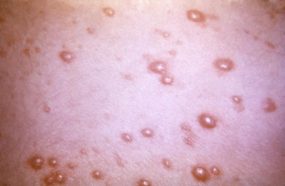Can Shingles Affect a Newborn Baby
An immunocompetent mother with shingles may be able to continue breastfeeding if she does not have skin lesions on her breast.

Shingles, also known as herpes zoster or zoster, is caused by the varicella zoster virus, the same virus that causes chickenpox (varicella). After a person recovers from chickenpox, the virus stays dormant (inactive) in the body and can reactivate years later, causing shingles. Anyone who has recovered from chickenpox may develop shingles, but the risk of shingles increases as you get older.
Shingles cannot be passed from one person to another and cannot be spread to an infant through breast milk. However, the varicella zoster virus can spread from a person who has active shingles and cause chickenpox in someone who has never had chickenpox or received the chickenpox vaccine. The virus is spread through direct contact with fluid from the rash blisters caused by shingles.
Should a mother with shingles continue to breastfeed?
Maybe. If a mother has active shingles infection, she can continue to breastfeed if she does not have skin lesions on her breast. If a lesion develops on or near the areola, where the infant's mouth would touch the lesion while nursing, then the mother needs to express her milk on that side to maintain her milk supply and prevent mastitis. She can discard that milk until the infant can resume nursing directly at that breast. She may need access to a hospital-grade pump and additional lactation support to maintain her milk supply and reduce the possibility of developing a breast infection.
Before expressing breast milk, mothers should wash their hands well with soap and water and, if using a pump, follow recommendations for proper cleaning. Breastfeeding can continue on the unaffected breast during this time. All lesions should be covered with clean, dry bandages until they are healed to avoid direct contact with an infant. Mothers need to be vigilant about hand washing until all lesions are fully crusted over.
Immunocompromised mothers who develop an active shingles infection can seek consultation from a specialist on how or if to proceed with breastfeeding. If the infant comes into direct contact with the shingles lesions, consultation with a pediatric specialist is recommended and Varicella-Zoster Immune Globulin may be considered.
Should a mother on antivirals continue to breastfeed?
Yes. Women can take antiviral medications to treat shingles while breastfeeding. Review the LactMedexternal icon database for the most current information on medications and lactation when advising breastfeeding mothers on medication safety.
If a mother is on antivirals, does her infant also need treatment?
Most infants who develop chickenpox can tolerate the infection. However some may experience complications. Mothers should consult their child's health care provider, even for infections that seem mild.
Is the varicella (chickenpox) vaccine safe to administer to lactating mothers?
Yes. The varicella vaccine should be administered to nursing mothers who lack evidence of immunity. Two doses of the chickenpox vaccine is more than 90% effective at preventing chickenpox. Excretion of the vaccine strain in human milk or of transmission to infants has not been found.
Can Shingles Affect a Newborn Baby
Source: https://www.cdc.gov/breastfeeding/breastfeeding-special-circumstances/maternal-or-infant-illnesses/shingles.html
0 Response to "Can Shingles Affect a Newborn Baby"
Post a Comment